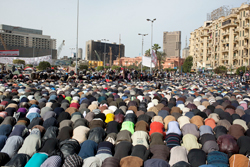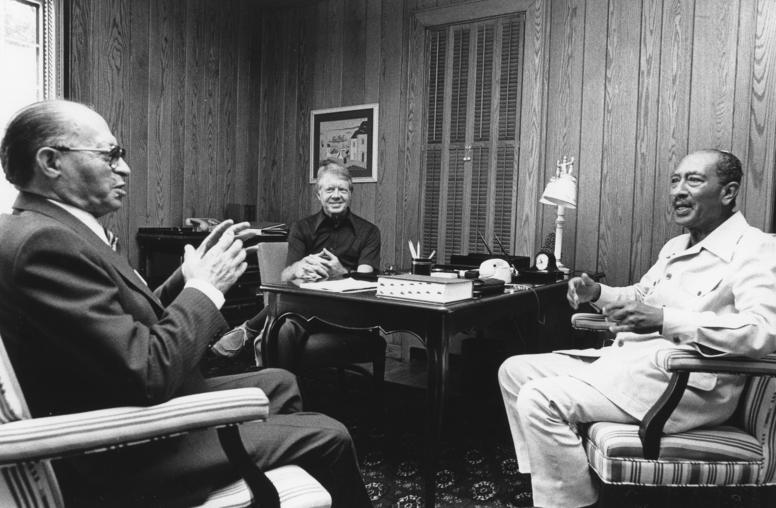Religion and Peacebuilding in Egypt
Religious tensions in Egypt recently erupted into violence at two churches near Cairo, highlighting the importance of interfaith dialogue. Read about USIP's work to improve Coptic-Muslim relations in Egypt.
May 9, 2011
Religious tensions in Egypt highlight the growing importance of interfaith dialogue. Weekend violence at two churches near Cairo led to recriminations against Egypt's ultraconservative Salafis, a radical Islamist group whose growing influence is worrying both secularists and the country's Christian minority. The torching of the Coptic Church of the Holy Virgin led the Egyptian army to arrest 190 people suspected of involvement in the clashes. The United States Institute of Peace has worked for many years on the ground to improve Coptic-Muslim relations in Egypt.
USIP's Work on Religion in Egypt
 Relations between Coptic Christians and Muslims in Egypt are among the major areas of work at the United States Institute of Peace which has been following these issues for decades. David Smock, senior vice president at USIP first began writing about these issues in the late 1990s, leading to the publication of his book, “Interfaith Dialogue and Peacebuilding ” by USIP Press in 2002. That same year Smock published a Special Report on “Islam and Democracy” as a by-product of a workshop co-sponsored with the Center for the Study of Islam and Democracy.
Relations between Coptic Christians and Muslims in Egypt are among the major areas of work at the United States Institute of Peace which has been following these issues for decades. David Smock, senior vice president at USIP first began writing about these issues in the late 1990s, leading to the publication of his book, “Interfaith Dialogue and Peacebuilding ” by USIP Press in 2002. That same year Smock published a Special Report on “Islam and Democracy” as a by-product of a workshop co-sponsored with the Center for the Study of Islam and Democracy.
More recently the Institute has held conferences and workshops on the future of democracy in Egypt and prospects for cooperation between the country’s Islamist and non-Islamist political opposition groups. In 2007 USIP issued a Peace Brief on “The Crisis in Interfaith Relations in the Middle East” by Paul Wee. That paper addressed the issue of Christians in Egypt . In 2008 in Cairo, USIP co-hosted the Second Annual Wasat Generation Dialogue along with the Al-Ahram Center for Political and Strategic Studies, and Georgetown University’s Center for Democracy and Civil Society. An outgrowth of USIP’s Arab Political Oppositions Project, this conference led to another USIP Peace Brief in June 2008 by Hesham Sallam, who served at a Special Advisor to USIP’s program.
The issues in Egypt challenge our thinking about peacemaking throughout the Arab world as well as the role of religion, and Islam in today's world. USIP recently published "Crescent and Dove" by Qamar-ul Huda, a major volume of work on the relationship between contemporary Islam and peacemaking. The book tackles the diverse interpretations, concepts, and problems in the field of Islamic peacemaking. Huda is a senior program officer in the Religion and Peacemaking Center of Innovation and a scholar of Islam at USIP. " Crescent and Dove" has been well reviewed and serves as one of the year's best books on exploring the practical challenges of contemporary peacemaking in Arab countries.
In addition, through the Institute’s Grant Program, USIP has worked to improve Coptic-Muslim relations through support of the Coptic Evangelical Organization for Social Services in Cairo (CEOSS). The current grant to CEOSS is funding advanced training for facilitators in peacebuilding and interreligious dialogue activities to advance religious tolerance, pluralism, and interfaith cooperation.
Read about USIP's Religion and Peacemaking Center of Innovation | See USIP's work on Religion and Peacemaking
More from USIP
- Download and read the chapter "Interfaith Dialogue in Egypt" from the USIP Press Book Unity in Diversity
August 2007 - Read "Justice and Security in the Middle East and North Africa," a Q+A with USIP Rule of Law expert Colette Rausch on justice and security dialogue in the Middle East/North Africa. Rausch discusses the possibility of religious violence, the security gap, and the lack of police action.
April 2011 - Take the free USIP online certificate course in Interfaith Conflict Resolution
- Read the USIP Special report "Teaching about the Religious Other"
July 2005 - Read the USIP Special Report "Abrahamic Alternatives to War: Jewish, Christian, and Muslim Perspectives on Just Peacemaking"
October 2008 - Read the USIP Press book Crescent & Dove: Peace and Conflict Resolution in Islam for more on religious peacebuilding, peace education, and case studies on nonviolence.
- Download a bibliography of suggested readings on interfaith dialogue
- Take the USIP Academy course "Overseas Religious Engagement." The course is offered from June 27, 2011-June 29, 2011.



